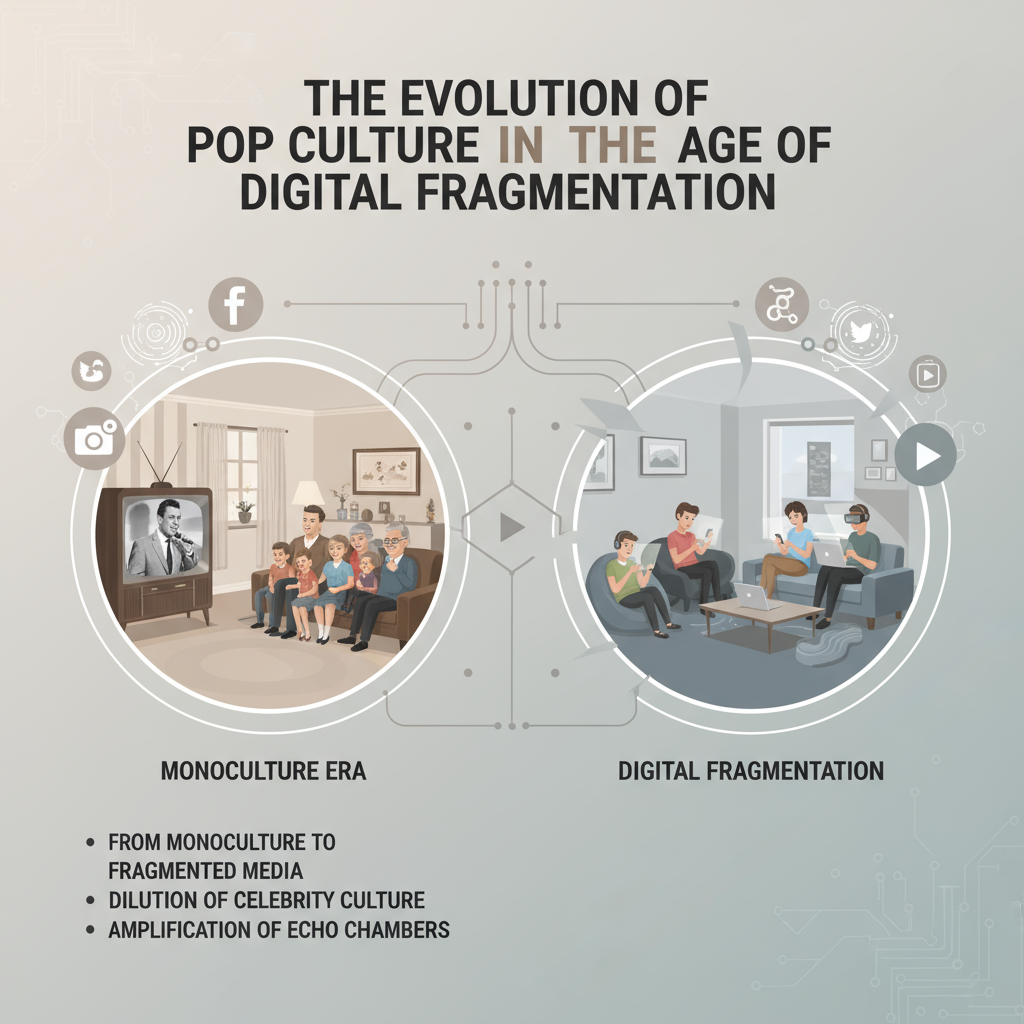
The Evolution of Pop Culture in the Age of Digital Fragmentation and Media Personalization
Popular culture has evolved from a centralized monoculture dominated by limited media channels to a fragmented, personalized landscape shaped by the internet and algorithms. This shift has dissolved widespread cultural moments and mass-celebrity prominence, replacing them with niche communities and micro-influencers. While this fragmentation challenges collective identity, media quality, and intensifies ideological echo chambers, it also democratizes cultural expression by amplifying diverse and marginalized voices. The result is a complex trade-off between personalized media experiences and the erosion of shared cultural frameworks, fundamentally transforming how audiences engage with culture in the digital age.
Summary
The Evolution of Pop Culture in the Age of Digital Fragmentation
Over the past few decades, the landscape of popular culture has undergone a profound transformation. Once dominated by a centralized monoculture facilitated by limited media channels and gatekeepers, today's pop culture is characterized by fragmented and personalized media consumption. This shift, driven largely by the internet and algorithm-driven content delivery, has significant implications for collective identity, celebrity culture, media quality, and ideological polarization.
From Monoculture to Fragmented Media
In the mid-20th century, television networks and major studios controlled the flow of media content, creating shared cultural moments that fostered a strong collective identity. Events such as the Super Bowl halftime show or mainstream award ceremonies united large audiences around common cultural experiences. However, with the advent of streaming platforms and social media, algorithms now curate content to fit individual preferences, resulting in filter bubbles and echo chambers that limit exposure to diverse viewpoints.
This digital fragmentation has segmented audiences into increasingly niche groups, reducing the prevalence of widely recognized celebrities and cultural icons. Instead, micro-influencers and specialized figures command attention within their distinct communities, diluting the traditional mass-media celebrity culture.
Implications of Media Fragmentation
The consequences of this shift are multifaceted:
- Dilution of Celebrity Culture: The rise of micro-influencers and niche audiences has dispersed celebrity prominence, making the concept of universally recognized stars less common.
- Challenges to Media Quality: The explosion of content, often referred to as "peak TV," combined with deepening ideological polarization, has sometimes resulted in media output that prioritizes political or ideological agendas over artistic merit and storytelling excellence. This trend poses risks of cultural stagnation.
- Erosion of Collective Identity: The once-strong shared cultural references that unified large populations have weakened. As individuals engage with highly personalized content, civic discourse and shared social narratives may suffer, affecting social cohesion.
- Amplification of Echo Chambers: Algorithmic curation on social media platforms intensifies ideological polarization by promoting selective exposure and homophily—the tendency to associate with like-minded individuals—further entrenching digital fragmentation.
The Trade-off: Personalization vs. Shared Culture
Despite these challenges, fragmentation offers notable benefits. The democratization of media enables marginalized and diverse voices to be amplified, providing representation that was limited under the gatekeeper-controlled monoculture. This dynamic media landscape fosters cultural diversity and allows for personalized media experiences that resonate more deeply with individual identities.
Thus, the transformation of pop culture represents a complex trade-off: while the loss of a shared cultural framework may reduce collective unity, it simultaneously enriches the media ecosystem with plurality and inclusivity.
Conclusion
The transition from a centralized pop culture monoculture to a fragmented, algorithm-driven media environment has reshaped how audiences consume content and relate to cultural phenomena. While this evolution challenges traditional notions of celebrity, collective identity, and media quality, it also democratizes cultural expression and amplifies niche voices. Understanding this balance is essential for navigating the future of media in an increasingly personalized and ideologically polarized digital world.

Frequently Asked Questions
Q: What is monoculture in pop culture?
A: Monoculture in pop culture refers to a dominant cultural trend or set of values that becomes widely accepted and homogenizes diverse cultural expressions. This often results in mass consumption of similar media, fashion, music, or entertainment, overshadowing niche or alternative voices. It can lead to reduced diversity in creative content, as mainstream ideas and styles overshadow unique or minority cultures.
Q: How has the internet affected pop culture?
A: The internet has profoundly transformed pop culture by enabling rapid and widespread sharing of trends, ideas, and content. Social media platforms allow artists, influencers, and fans to interact directly, accelerating the formation and evolution of viral phenomena. It has also democratized content creation, allowing diverse voices to influence mainstream culture and breaking down traditional gatekeepers such as TV networks and record labels. Overall, the internet has made pop culture more dynamic, accessible, and globally interconnected.
Q: Why is pop culture fragmented today?
A: Pop culture is fragmented today largely due to the rise of digital media and the internet, which provide access to a vast array of content catering to diverse interests and communities. Unlike the past, when television and radio limited audiences to a few channels, today's platforms allow niche groups to thrive, leading to multiple subcultures. Social media and personalized algorithms further segment audiences by tailoring content to individual preferences, reducing shared cultural experiences and creating a more fragmented cultural landscape.
Q: What caused the decline of mainstream TV and film?
A: The decline of mainstream TV and film has been driven by several factors, including the rise of streaming services that offer on-demand, personalized content without traditional advertising interruptions. Audiences now seek diverse, niche, and international content that often isn't provided by mainstream outlets. Additionally, shifts in consumer habits toward mobile and internet-based viewing, alongside increased competition from social media and user-generated content platforms, have reduced the dominance of conventional TV and film industries.
Q: Is the golden age of television over?
A: The golden age of television, often associated with high-quality, innovative, and culturally impactful shows primarily from the early 2000s to the 2010s, is a subject of debate. While some argue that the surge of streaming platforms and changes in viewing habits have fragmented audiences and reduced the dominance of groundbreaking TV, others believe that television continues to produce diverse and compelling content in a new, evolving landscape. Ultimately, whether the golden age is over depends on how one defines it—many consider the current era as a new golden age characterized by greater access and creative freedom.
Key Entities
Matt Walsh: Matt Walsh is a conservative political commentator and writer known for his commentary on culture and social issues. He frequently contributes to The Daily Wire and engages audiences with his outspoken views on public policy and religion.
Michael Jackson: Michael Jackson was an American singer, songwriter, and dancer, widely regarded as the 'King of Pop' for his influential contributions to music and entertainment. His legacy includes groundbreaking performances and record-breaking albums that reshaped the global music industry.
Tom Cruise: Tom Cruise is an American actor and producer celebrated for his roles in blockbuster films such as Top Gun and the Mission: Impossible series. He is known for performing many of his own stunts and maintaining a high profile in Hollywood over several decades.
Jason Pargin: Jason Pargin is an American author best known for his comedic horror novels under the pseudonym David Wong, including 'John Dies at the End.' He has also worked as an editor for Cracked.com, blending humor with social commentary.
Paul Skallas: Paul Skallas is a writer and cultural critic who explores themes related to masculinity, personality, and personal development. His work often appears on platforms focusing on men's issues and modern social dynamics.
External articles
- The Disappearance of Pop Culture
- People are overstating the “death of monoculture”
- Is This the Worst-Ever Era of American Pop Culture?
Articles in same category
- Victoria’s Secret Brand Identity Crisis and Shift to Inclusivity
- Assessing Donald Trump's Prospects for the Nobel Peace Prize: Independence, Criteria, and Controversies
- Rising Interest in Norwegian Language and Culture Among Young Americans
YouTube Video
Title: The Death of Monoculture: Why Culture Feels So Fragmented Now
Channel: baldbookgeek
URL: https://www.youtube.com/watch?v=5zYx-w2HEHE
Published: 8 days ago
Life